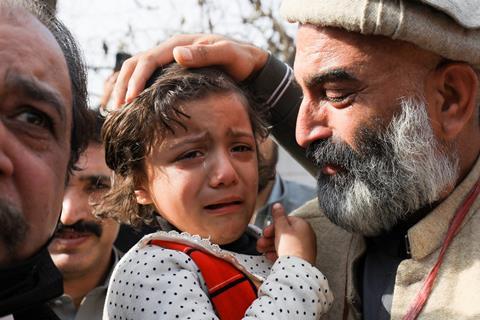The New Testament commands us to “mourn with those who mourn”, says religious freedom advocate Rev Johnnie Moore. That instruction applies to our Muslim friends as much as our Christian friends, he says

If you’re a Christian, you should really take a moment to watch the video of the aftermath of the terrorist attack targeting a mosque in Peshawar, Pakistan a few days ago.
Let it sink in when you do.
The horrific, suicide bombing at the hands of a terrorist killed more than 100 people, injuring hundreds of others. Among those killed were children and the elderly.
And, how should we as Christians respond?
We should grieve. We should pray for those mourning their loss and those fighting to survive.
We should also pray for security across Pakistan, and we should let our Muslim neighbors know that our Christian faith compels us to carry this burden of collective pain with them. They need to know that we noticed.
This is the Christian response.
we should let our Muslim neighbors know that our Christian faith compels us to carry this burden of collective pain with them
Paul penned many profound words in the Christian New Testament, but none are more powerful than these: “grieve with those who grieve and mourn with those who mourn.” (Romans 12:15)
Notice, however, Paul didn’t write, “grieve with those Christians who grieve and mourn with those Christians who mourn.”
The Apostle explicitly wanted us to feel profound, deep-seated grief when any human being - all of which are made in the image of God himself -face the crippling pain of grief.
These aren’t meant to be just sentimental feelings either. Paul’s writings are deeply emotional. In the context of those unjustly imprisoned for their faith he wrote to the Hebrews, “remember those in prison, as if you were there yourself.” (Hebrews 13:3)
It isn’t enough to just express concern, to be an advocate or even to pray. Paul says God expects a deeply empathetic response that begins with imagining it was you, not them.
Then, once you feel that pain, act.
We should care as if we were the ones suffering.
This same mentality also extends to our advocacy for justice for anyone facing injustice, including the persecuted.
We Christians certainly understand what it’s like to be targeted for our faith. We are harassed, imprisoned, marginalised, threatened, and sometimes killed in many countries around the world. Our churches have been viciously attacked, burned to the ground, ransacked, and cursed from seats of power. We have faced discrimination, unjust regulation, and extortion. All of these are reasons why Christians have become the world’s loudest and most impactful advocates for religious freedom, including the freedom to worship without fear.
Yet, we must also remember that as Christians do not believe in religious freedom at all unless we are advocates of religious freedom for all.
Did you know, for instance, more Muslims have been killed by terrorists than Christians?
No one, whatever their religion, should fear walking into their place of worship.
Everyone, whatever their religion, should know that the world’s Christians are advocates for them, not just for us.
But, it’s hard to mourn with Muslims in Pakistan if we don’t know Muslims at home. It’s hard to speak up for the persecuted whose faith or creed is separate from our own if we don’t know their names and their pain.
We aren’t compromising our own faith by having deep friendships with those who believe differently than we do. In fact, I’ve often found I have more in common with a Muslim who has a high view of God than of a cultural Christian who lives as a practical atheist. One of the great blessings of my life has been to enjoy deep relationships with Muslim, Jewish, Hindu, Buddhist, and other friends.
Right about now, Muslims in Pakistan especially need to know we notice their grief.
So, I have a suggestion. Why not take just a moment…imagine if it was your church, not their mosque, and your family member and not theirs. After you do, send a prayer for those grieving from your knees to God’s ears or maybe you want to post a similar sentiment on social media (Maybe something like this). It’s the Christian thing to do.

Scott Morrison: 'God provided the headspace for me to lead through those very difficult days and we were able to save a lot of lives'
When Christians were spat on, Israel took swift action. If only other Middle Eastern nations cared as much
A silent genocide is being waged against Christians in Nigeria. The world must act now





































No comments yet